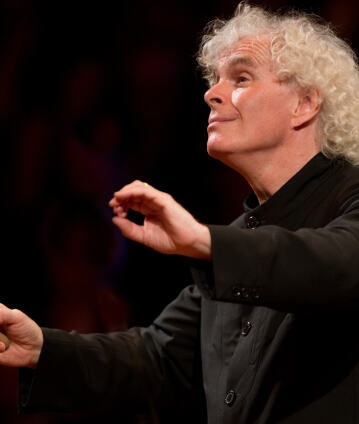Simon Rattle conducts Dvořák, Turnage and Brahms

Rarely is classical music as cheerful as in the serenades of the 18th century. Simon Rattle shows at this concert how ingeniously the genre was taken up in the late romantic era. Thus, for instance, Antonín Dvořák expanded traditional forms in his wind serenade to include Bohemian colours. Johannes Brahms, whose Serenade No. 2 has almost symphonic dimensions, went even one step further. There is also a new work by Mark-Anthony Turnage.
One can hardly imagine an orchestra concert that does without violins completely. Sir Simon Rattle, however, has put together just such a programme, guaranteeing an interesting listening experience. Johannes Brahms believed he heard the symphonic composer Beethoven “marching behind him like a giant”. In 1862, for instance, he wrote to his friend, violinist Joseph Joachim: “After ‘Symphonies by J.B.’ you may for the time being place a ?” By this time, Brahms had long since honed his skills in orchestral setting with other musical genres. After the Serenade in D major op. 11, composed in 1858 and printed two years later, the A major Serenade op. 16, which he worked on at the same time, constitutes Brahms’s second attempt to write an orchestral work of several movements without having to risk direct comparison with the overwhelming figure of Beethoven. These two contributions to the genre by Brahms have little in common, however, with serenades of the old mould. This is evident not only in their playing time, expanded to symphonic proportions, but also in the large orchestra; the instrumentation for the A major Serenade is particularly out of the ordinary as it dispenses with violins. Brahms attained in this way a romantic dark sonority – despite using a piccolo flute in the last of the five movements.
Antonín Dvořák, who was significantly promoted by Brahms, oriented himself much more strongly towards role models from the heyday of the genre when writing his Serenade in D minor op. 44 in 1878 – the work’s wind section seconded only by low strings indeed meets the typical standard for serenades in the 18th century. In addition, this work proves that the individual to whom it was dedicated – the composer and music critic Louis Ehlert – was right when he lauded the “heavenly naturalness” of Dvořák’s music in the Berliner National-Zeitung in 1878: “There is no trace of affectation or artificiality in it.” It was also Ehlert who wrote, referring to the contemporary music of his time: “The men who at present awaken the greatest interest in the sphere of music are so terribly serious. We must study them, and after studying them must buy a revolver in order to defend our opinion of them.”
Understanding music as a means of remembering has been the subject of a number of works by the British composer Mark-Anthony Turnage (b. 1960). His work Remembering – a joint commission of the Berliner Philharmoniker Foundation and the Boston and London Symphony orchestras – was written in memory of the writer and musician Evan Scofield, who died in 2013 at the age of 25. In his work, Turnage remains true to his style, a “distinctive mixture of aggressive and lyrical qualities” (Anthony Burton) evoking fragmented reminiscences of a versatile artist and human being.
© 2017 Berlin Phil Media GmbH
Related interviews
Artists
Our recommendations
- “Late Night” concert with Simon Rattle and Barbara Hannigan
- Simon Rattle conducts Mozart and Strauss at the 2006 New Year’s Eve Concert
- Simon Rattle conducts Beethoven’s “Pastoral” Symphony and Modernist concertos
- “La Damnation de Faust” with Simon Rattle, Joyce DiDonato and Charles Castronovo
- Simon Rattle conducts Mozart’s Symphonies Nos. 39, 40 & 41
- Bach’s “St Matthew Passion” with Simon Rattle and Peter Sellars